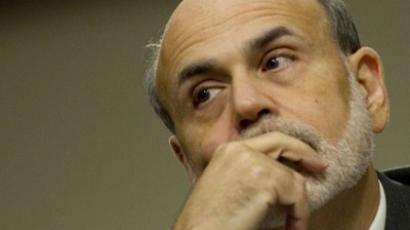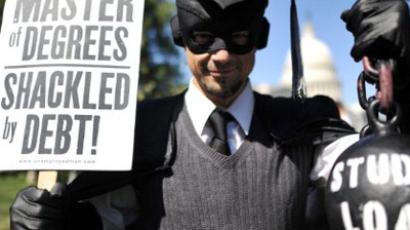Class action: OWS first salvo in US class war?
A class war once seemed impossible in a country where being wealthy is part of the national dream. But as thousands march on Wall Street and in other parts of America, digging in with anti-corporate protests, many ask whether US is facing one.
It is week five of the Occupy Wall Street rallying call against bloated banks and Washington's weakness in doing anything about it. And the growing gap between rich and poor is something which could cost the government dear.“The rich are getting richer and the middle class is collapsing,” says Bernie Sanders, United States Senator for Vermont. “Class war is being waged in America, today. Unfortunately, the wrong side is winning.”The so-called “one per cent” of winners are the nation’s top corporations, which this year – despite the economy’s very slow growth – have nonetheless made record profits.But thanks to various loopholes, “these corporations pay little or nothing in taxes,” Sanders said.The corporations say they need the tax breaks to be able to invest more and to hire more staff.America’s second largest energy producer, Chevron, is now lobbying not to let the government tax them more. And to RT’s question, “How many Americans has Chevron hired since the tax breaks were introduced in 2004,” the CEO of the company, John Watson, answered: “They are up slightly – a few thousands in our upstream business over the years, but not significantly on our Chevron payroll.”Just a few thousand jobs for the billions of dollars in tax stimulus that the government gave them.Economists say America’s largest corporations are sitting on more than $3 trillion and not investing in the economy.Unemployment in the US remains over 9 per cent. “I have enough money to survive my lifetime,” says an ordinary elderly US citizen and grandfather. “But it’s my great grandkids…My grandkids, they can’t make it.”And the Wall Street’s answer to people’s rage is, “If you kill Wall Street, there will be nobody out there to create jobs.”But as one of the protesters tried to put a word of objection, the same Wall Street tycoon expressed his attitude towards these desperate people. “Hold on, it’s not your show, monkey,” he said. “I’m talking to these people. Hold on, I’m not talking to you. Monkey!”Personal success – and money – have always been part of the American Dream. The aspiration to become rich is deeply ingrained in American society and widely promoted by pop culture. But those who took to the streets have made it clear that the situation when the rich are getting richer and the poor are getting poorer is not their idea of the American Dream.














